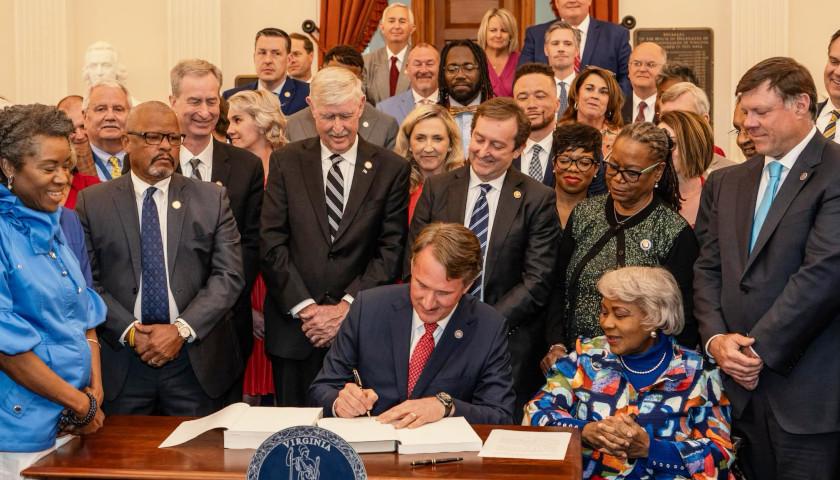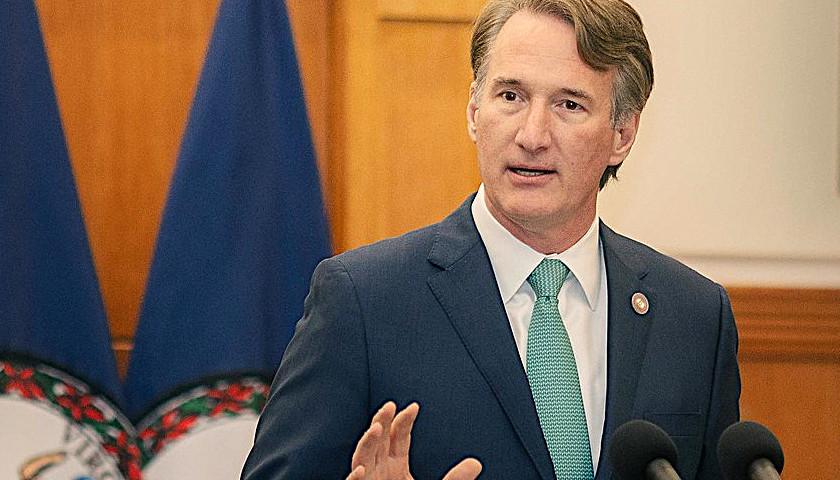by Morgan Sweeney
Gov. Glenn Youngkin signed Virginia’s budget for fiscal years 2025-2026 Monday after the state’s General Assembly voted to pass it in a special session convened for that purpose.
The $188 billion biennial budget was agreed upon at the tail end of last week after protracted and extensive negotiations between Youngkin and conferees.
Despite the Republican governor holding the line and not allowing taxes to be increased, he and the Democratic-majority General Assembly were able to reach a compromise due in large part to general fund revenues to date exceeding forecasts. They’re currently expected to surpass original projections for the year by over $1 billion.
“While Virginians’ elected officials can sometimes be far apart on policy, today demonstrates and reiterates that we can come together to deliver for the Commonwealth. This budget resolution was empowered by the strength of our labor market, with more Virginians working than ever before and investments by businesses large and small that have fueled record revenues for the Commonwealth,” Youngkin said in a statement.
Democrats tried to include a digital sales tax in the compromise budget – something they adopted from Youngkin’s December budget proposal – but the governor objected to the tax without the accompanying tax breaks he had included in his introduced budget.
While the sales tax would have increased revenues by over $1 billion, the budget passed Monday relies on $525 million from excess revenues to help implement some Democratic priorities.
Chair of the Senate finance committee Sen. Louise Lucas, D-Portsmouth – one of the most vocal critics of some of Youngkin’s budget proposals and goals – lauded the conferees’ work and praised the final product.
“I want to take this moment to thank the conferees and the committee staff for their hard work and dedication,” Lucas said. “There’s a lot to love about this budget…. This is a win for the commonwealth.”
The budget includes 3% raises for teachers and state government employees each year and increased funding for K-12 schools and higher education. It also includes additional funding for law enforcement, mental health and substance abuse treatment services, transportation and conservation, among other initiatives.
Notably, the budget lacks one other item for which Democrats fought intensely: Looping Virginia back into the Regional Greenhouse Gas Initiative. On Youngkin’s first day in office, he issued an executive order to sever Virginia’s ties with the initiative, viewing it as a burden to Virginia’s pro-business environment and as a “backdoor tax” to residents whose energy bills could be raised by utilities trying to recoup costs.
Legislation making Virginia a part of the Initiative was passed in 2020. The Initiative attaches a cost to CO2 emissions. Participating states – a coalition of 11 Northeastern states before Virginia joined – place limits on how many CO2 emissions power plants can produce. Plants can purchase emissions credits if they need more allowable emissions or risk penalties and fines. A lawsuit claiming Youngkin acted outside the scope of his powers as governor by effectively repealing passed legislation through executive action is ongoing.
Del. Richard Sullivan, D-Fairfax, lamented the death of Democrats’ efforts to incorporate RGGI back into Virginia policy through the budget from the floor – while vowing to resurrect it in the future.
“I will vote today for the budget, Mr. Speaker, because of the long list of important advances it makes for the commonwealth. But my vote will be tempered by great disappointment at an opportunity squandered by our governor,” Sullivan said. “Also my vote will be filled with resolve to get Virginia back into RGGI just as soon as possible. This is not over.”
Republicans aren’t thrilled with many aspects of the freshly approved budget, but most voted to pass it.
“While the budget isn’t what a Republican House of Delegates would have produced, the document signed by the Governor today is a significant improvement over the budget sent to him at the end of the regular session,” said House Minority Leader Del. Todd Gilbert, R-Shenandoah, in a statement.
“Today’s budget contains no tax increases and does not require that Virginia rejoin the failed Regional Greenhouse Gas Initiative. It reflects compromise, with both sides dealing in good faith to meet our most basic responsibility,” Gilbert said
If lawmakers had not been able to compromise with the governor by June 30, Virginia would have been at risk of a government shutdown.
– – –
Morgan Sweeney is a staff writer covering Virginia and Maryland for The Center Square. Morgan was an active member of the journalism program as an undergraduate at Hillsdale College and previously freelanced for The Center Square.
Photo “Glenn Youngkin” by Governor of Virginia.





